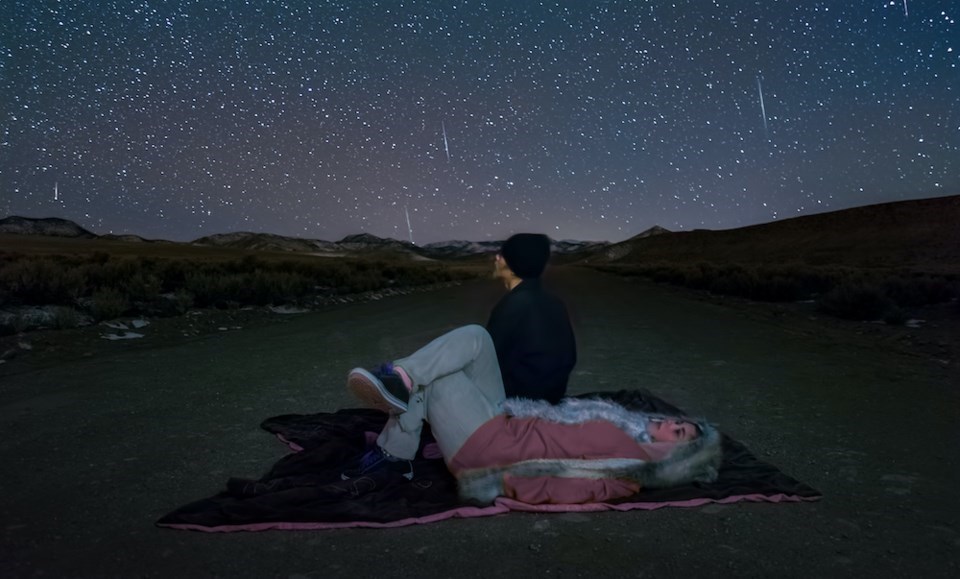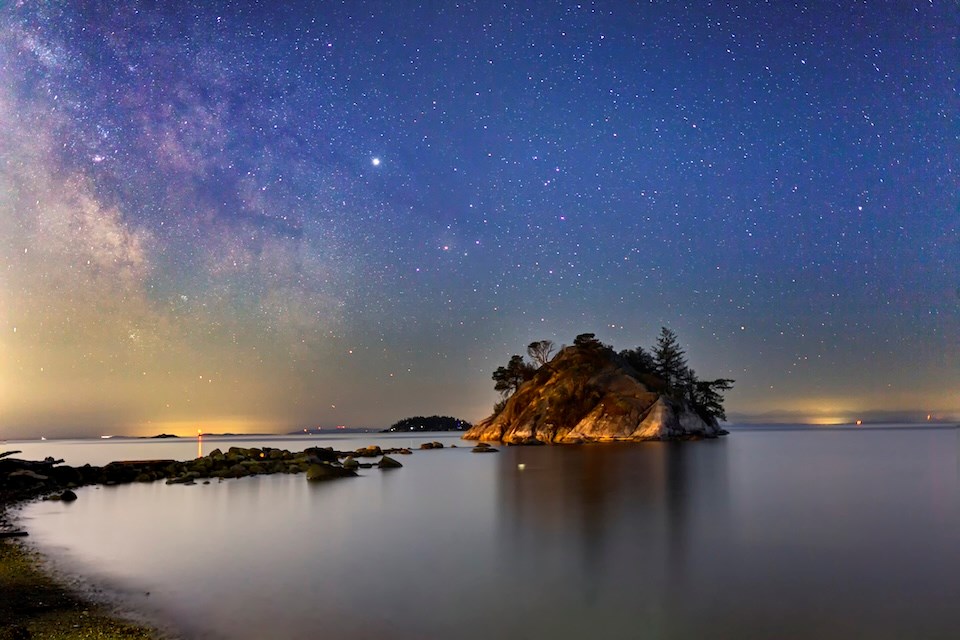Stargazing is a magical experience to enjoy across B.C.'s beautiful backyard, but urban centres display only a portion of the glittering sky jewels.
Light pollution obscures the night sky in bustling metropolises, meaning you'll observe a sky littered with twinkling stars from a campground deep in a provincial park (which can be a delightful surprise for city dwellers).
People living in Canada's big cities can no longer see 95 per cent of the stars that should be visible to the naked eye, H.R. MacMillan Space Centre astronomer Rosanna Tilbrook tells V.I.A.
Sadly, the view of the stars diminishes annually.
"A 2023 study on light pollution found that, on average across the globe, the amount of light pollution doubles every eight years," she explains. "This will continue to decrease the number of stars that we can see from Vancouver."
Aaron C. Boley is an associate professor and Canada Research Chair in Planetary Astronomy in the Department of Physics and Astronomy, Faculty of Science, at the University of British Columbia. He is also the co-director of The Outer Space Institute, a transdisciplinary organization that addresses challenges associated with NewSpace.
Boley says, globally, sky brightness increases anywhere from two to three per cent annually, although some large cities experience higher light pollution.
A mission to save the stars
DarkSky International is a group of over 2,000 global volunteers striving to protect the night sky through education, advocacy, retrofits, and community science. They provide information about how light pollution affects everything from climate change to human health to wildlife and more.
The advocacy group highlights how just over a century ago, the night skies were very dark, but now even wilderness areas are invaded by light.
People living in big cities have already lost the ability to view the breathtaking features of the celestial dome. The Milky Way is a faint band of light that should cross the inky black sky, but light pollution washes it from view with the naked eye in places such as Vancouver.
Boley notes that newer technology, such as LED lighting, causes greater light pollution in Vancouver because it uses blue-spectrum lighting instead of yellow.
"You might look at LEDs and think, 'This is great because it's so low energy usage compared with everything else. You get a lot more light for the amount of energy,'" he notes. "But there are two issues that go along with it. One is that we can quickly run into a concept known as Jevons' Paradox, where as you increase the efficiency of the use of the resource, you stimulate more demand for it.
"And so any efficiencies you get, you have similar impacts because you want more of it. So with energy lighting being cheaper, there is this desire to have more of it."

Shift to blue light has devastating impacts on humans, the environment
Boley says the shift from the lights that gave a yellow glow to an LED light's bluer hue makes it seem like daytime, and these effects are "devastating."
Exposure to light at night affects human circadian rhythms that regulate sleep cycles. People living in light-polluted cities struggle with sleep, which has adverse effects on physical and mental health.
Lights at night disrupt plant growth and can cause migrating birds to wander off their path into dangerous urban environments, where they may crash into buildings. Since so many migratory birds move through Metro Vancouver's airspace, more fowl are likely to encounter problems as the night sky brights, Boley notes.
Many cities also increase lighting in areas to "keep people safer," although studies indicate that brighter streets aren't necessarily less dangerous. While lighting is necessary on roads, ultra-bright lighting may increase accidents by "blinding" drivers or pedestrians. A Chicago study found that overly bright alleys actually increased crime by providing shadowy spots for criminals to hide in, according to DarkSky.
Boley notes that cities and people should focus on "smart lighting" to prevent future star loss and to keep communities safer and people and wildlife healthy. Smart lighting practices focus on using the minimum amount of light to keep streets and people safe, and using yellower lighting versus blue. Streetlights and other lighting shouldn't "broadcast indiscriminately." Instead, coverings should control where the light shines.
How fast will Vancouver lose the stars?
Vancouverites are slowly but increasingly losing their view of the starry night sky.
"As you look at the stars, you start to lose more and more in the sky every year. It's really hard to get people to visualize it, but what I would suggest is having people imagine, kind of speeding up time a little bit as they stare at a dark sky, and imagine every minute of the year as you're looking at the stars, you're losing a few per cent of them," he says.
"And that's going to keep happening and happening because it's so bright."
Other features, such as the aurora borealis, will become invisible in Vancouver. While it is difficult to see now, it is possible.
Boley says eventually locals will only be able to see the brightest celestial objects, including planets, and, of course, the moon. It is impossible to determine exactly how fast this is happening, but it is increasing annually. However, he notes that using smart lighting methods can prevent star loss and all the other negative ramifications that come with it.
"It isn't a lost cause," he says. "People recognize that there is an issue with intrusive lighting."
Tilbrook adds that it will also be more difficult to view the sky from the H.R. MacMillan Space Centre as the sky-brightening process continues.
"As we are located in a large city, light pollution already makes it hard to observe faint objects, like nebulae and star clusters," she notes.
"However, the planetarium will always offer a glimpse of a truly unspoiled sky, and perhaps that view will become especially valuable to Vancouverites in the future."
Stay up-to-date with hyperlocal weather forecasts across 50 neighbourhoods in the Lower Mainland with Weatherhood.



